Welcome to a BetaKit weekly series designed to help startups and entrepreneurs. Each week, investors tackle the tough questions facing founders today. Have a question you would like answered? Tweet them with the #askaninvestor hashtag, or email them here.
VCs give many reasons for passing on an investment. The best will tell you what they loved and what they ultimately couldn’t wrap their heads around. The worst will simply leave you hanging. In between, there are a multitude of reasons, which is where yours falls — the VC is at the end of their investment period.
Our predecessor, Katherine Homuth, mentioned activity as one of the key insights you should be looking to uncover on your VCs, highlighting that you should make sure the investors you’re contacting have written a cheque in the last 12 months.
This is great advice, but it misses a few nuances as you move up the investing chain from angel investors to institutional funds.
First things first — what is an investment period?
When institutional VCs raise a fund, they (as the fund GPs), typically agree to a 10-year lifetime with their investors (their LPs). This creates a commitment to return all capital within 10 years.*
But here’s the catch: GPs only make new investments for the first four years of that lifetime. When GPs are creating their portfolio construction, they’ll plan to hold a certain amount of capital (often as much as 50 to 60 percent) as follow-on capital for portfolio companies, also known as “reserves.”
Investors have to look at their investments at a portfolio level, as well as based on their individual merits.
These reserves are distributed over the remainder of the fund lifecycle (disproportionately in years five to eight) and help VCs maximize their ownership in outperformers and avoid seeing their equity washed-out by subsequent term sheets with pay-to-play rounds. Reserve capital and new investment capital isn’t interchangeable – a VC firm’s returns are ultimately determined by their ability to allocate capital across their outperforming companies, so don’t expect to be able to sway a VC to allocate a reserve dollar for your first funding round.
If you aren’t aware of these fundraising dynamics, it can be hard to understand where in a fund lifecycle a VC firm is. Investors will continue to announce their follow-on investments, and if you don’t do your homework and understand who’s in a VCs portfolio (and when they invested), it can seem like these are actually new investments.
However, most VCs get into the business because they’re energized by meeting new founders and making new investments. Because they can’t make new investments in years five to 10, firms typically raise new funds every four years.
This means they’ll always have a firm writing cheques into new companies, and they’ll maximize their opportunity to make new investments. Unfortunately, fund lifecycles don’t always perfectly line up. Fundraising can take a bit longer than the GP anticipated, or they can see stronger dealflow than previously and invest their entire allocation in three years.
Even when a fund has capital remaining for new investments, GPs will seriously evaluate their portfolio construction once they’re halfway through the investment timeline to make sure they’re on track.
If you’re really looking for a way to work together, consider saving some space and delaying your close.
Investors have to look at their investments at a portfolio level, as well as based on their individual merits. The GP will typically reflect on if the portfolio reflects their planned construction from a risk perspective, a stage perspective, and a performance perspective. They’ll also consider market factors — like if they’re seeing a dramatic increase in valuations or unexpected competition at a specific stage of investments.
By year three, the fund is no longer a blank slate and the GP might no longer be looking for the best investment or a credible series A investment – they might be looking for the best series A investment they’re likely to see in a two year period.
So what should you think when a VC tells you they can’t invest in your company because it doesn’t align with their investment period? Ultimately, it’s an honest answer and they’re a strong lead to nurture for future investments.
If they’re towards the end of the fundraising process and you’re really looking for a way to work together, consider saving some space and delaying your close (or holding a second close). Otherwise, stay in touch, prime them to invest in your next funding round, and ask them to provide glowing references to VCs they respect who can invest in your startup now.
And in the future, do your diligence at the front-end of the investment conversation and ask your VCs:
- What year of the fund are you on?
- How much remaining capital do you have allocated for new investments?
- What stage do you want those investments to be?
- What sector do you want those investments to be?
- Are you staying in an investment role with the new fund?
Christian’s take:

The ideal time to raise money from a fund is early in their investment period, when they have the most flexibility with both sector, stage, and duration risk. However, hitting up funds in their sweet spot is like trying to market time your stock picking – it’s all but impossible and generally will lead to suboptimal results. In other words, stick with the tried and true.
Asking Sarah’s questions after the initial meeting with a fund is generally a good time. After your initial pitch, some funds will ask whether you have any questions; this is the perfect time to bring these questions up. Funds will typically be open with their answers. If they are hedging or not giving you straight answers it’s likely they have bad news for you and just don’t want to tell you.
There are a couple of reasons and not all of them are necessarily bad news for you.
1. The current active fund has only a spot or two left open and you don’t fit their needs for those slots – Sarah covered this above.
2. A venture firm may have no active fund
Their last fund’s investment period is over, but they haven’t closed their next fund. As Sarah pointed out, funds may reach the end of the investment period, and for whatever reason, the VCs didn’t get their next fund up and running yet. They’ll still be making follow-on investments, but can’t write cheques to new companies. Unless they plan on winding down the fund (they aren’t), the fund managers are out fundraising like crazy while also seeing new businesses (like yours). These VCs have a strong incentive to find especially enticing deals.
3. A firm may be in breach of its LPA
Each fund has a bunch of rules, all bundled up in what’s called a Limited Partnership Agreement (LPA). If a fund breaches one of those rules, one thing that happens is they can’t invest any more money – until they fix the problem.
One easier example is if a key partner leaves the firm. If that partner is considered a keyman in the LPA, a VC fund won’t be allowed to invest any more money until they hire his or her replacement AND the limited partners agree that the new hire fixes the keyman provision. People move around in any business so this case is not entirely unheard of.
Most venture funds are well run but breaches happen on occasion and it can often take months to get the Limited Partners to agree that it’s been fixed.
At first glance, a fund that can’t invest may seem like bad news. However, if your company is a strategic fit for a fund, you may be a catalyst that helps rally the Limited Partners to agree to a first close or extend an investment period, as appropriate.
Venture Funds rules can be complex, having advisors in your network who have some experience with them can help companies navigate those waters. Lastly, as always, open bi-lateral communication with your potential funding partners is critical and leads to good outcomes for all.
*As an aside, real life exits don’t perfectly map to pre-determined exit timelines, and VC funds don’t immediately liquidate all their equity holdings on the last day of year 10.


